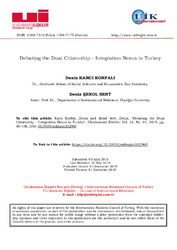Debating the dual citizenship – integration nexus in Turkey
| dc.contributor.author | Korfalı, D. K. | |
| dc.contributor.author | Sert, Deniz Şenol | |
| dc.date.accessioned | 2020-08-27T06:17:49Z | |
| dc.date.available | 2020-08-27T06:17:49Z | |
| dc.date.issued | 2019 | |
| dc.identifier.issn | 1304-7310 | en_US |
| dc.identifier.uri | http://hdl.handle.net/10679/6837 | |
| dc.identifier.uri | https://dergipark.org.tr/tr/pub/uidergisi/issue/50432/652960 | |
| dc.description.abstract | This article explores the institution of dual citizenship outside of the West and focuses on Turkey to assess the possible relationship between dual citizenship and the integration of migrants, drawing on Kymlicka and Norman's (2000) dimensions of citizenship framework, with its tripartite focus on formal status, activity and identity. The research incorporates the perspectives of the three key groups of actors involved in international migration: the host state, the major sending states, and the migrants themselves. Our findings indicate that dual citizenship is neither a barrier to, nor facilitator of, integration in the citizenship dimension of activity in Turkey. Rather, integration - perceived as economic participation by the great majority of the actors - is linked not to dual citizenship per se, but to the acquisition of citizenship in the host country. | en_US |
| dc.description.abstract | Bu makale, çifte vatandaşlık literatürünü Batı ekseninin dışında tartışarak Türkiye örneğine odaklanmaktadır. Çifte vatandaşlık ile göçmenlerin entegrasyonu arasındaki olası ilişki, Kymlicka ve Norman’ın (2000) vatandaşlık çerçevesinde resmi statü, faaliyet ve kimlik üzerine oluşturdukları üçlü odak kapsamında değerlendirilmektedir. Araştırma, uluslararası göçün içerdiği üç kilit aktör grubunun perspektiflerini içermektedir: ev sahibi devlet, göçmen gönderen ülkeler ve göçmenlerin kendileri. Bulgularımız, entegrasyon ekseninde, çifte vatandaşlığın Türkiye’de ne engelleyici ne de kolaylaştırıcı olmadığını göstermektedir. Aksine, aktörlerin büyük çoğunluğunun ekonomik katılım olarak algıladığı entegrasyon, çifte vatandaşlık ile değil, ev sahibi ülkede vatandaşlığın kazanılması ile ilişkilendirilmektedir. | |
| dc.language.iso | eng | en_US |
| dc.publisher | Uluslararası İlişkiler Konseyi Derneği İktisadi İşletmesi | en_US |
| dc.relation.ispartof | Uluslararası İlişkiler Dergisi | |
| dc.rights | openAccess | |
| dc.title | Debating the dual citizenship – integration nexus in Turkey | en_US |
| dc.title.alternative | Türkiye’de çifte vatandaşlık-entegrasyon ilişkisini tartışmak | |
| dc.type | Article | en_US |
| dc.description.version | Publisher version | en_US |
| dc.peerreviewed | yes | en_US |
| dc.publicationstatus | Published | en_US |
| dc.contributor.department | Özyeğin University | |
| dc.contributor.authorID | (ORCID 0000-0002-5360-6642 & YÖK ID 25879) Sert, Deniz | |
| dc.contributor.ozuauthor | Sert, Deniz Şenol | |
| dc.identifier.volume | 16 | en_US |
| dc.identifier.issue | 64 | en_US |
| dc.identifier.startpage | 93 | en_US |
| dc.identifier.endpage | 106 | en_US |
| dc.identifier.wos | WOS:000500160100003 | |
| dc.identifier.doi | 10.33458/uidergisi.652960 | en_US |
| dc.subject.keywords | Dual citizenship | en_US |
| dc.subject.keywords | Integration | en_US |
| dc.subject.keywords | Immigration | en_US |
| dc.subject.keywords | Turkey | en_US |
| dc.subject.keywords | Citizenship dimensions | en_US |
| dc.subject.keywords | Çifte vatandaşlık | |
| dc.subject.keywords | Entegrasyon | |
| dc.subject.keywords | Göç | |
| dc.subject.keywords | Türkiye | |
| dc.subject.keywords | Vatandaşlık boyutları | |
| dc.identifier.scopus | SCOPUS:2-s2.0-85077072939 | |
| dc.contributor.authorFemale | 1 | |
| dc.relation.publicationcategory | Article - International Refereed Journal - Institution Academic Staff |
Files in this item
This item appears in the following Collection(s)
Share this page



